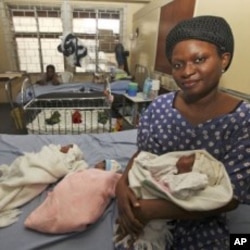The world's population hit 7 billion on Monday amid celebrations and concerns about how the growing number of people will impact the earth's resources.
The United Nations chose October 31 to mark the milestone.
Although it is impossible to pinpoint the arrival of the world's 7 billionth baby, the Philippines was the first country to publicly declare the symbolic feat. Danica May Camacho was delivered just before midnight Sunday in a Manila hospital.
Celebrations were also held in India, which could soon overtake China as the world's most populous nation.
While the population's 7 billion milestone is seen as a sign of increased longevity and improved birth survival rates, experts also warn of the growing population's struggle for resources, including food and water.
Officials with the U.N. Population Fund say many low-income countries of sub-Saharan Africa and some in Asia have seen a growth in population that is outpacing economic growth rates.
Fertility rates in many European nations and Japan have dropped below the replacement rate, causing concern that shortages of labor and productivity could threaten the quality of life.
According to the latest U.N. figures, the world’s population is projected to surge past 9 billion before 2050 and reach 10.1 billion by the end of the century if current fertility rates continue at expected levels.
China's population of 1.34 billion is currently the world's highest. India comes in second, with 1.2 billion.
Asia's population of 4.2 billion makes it the world's most populous region.
Africa's population is expected to triple to 3.6 billion people by the start of the next century.
Some information for this report was provided by AP and AFP.





